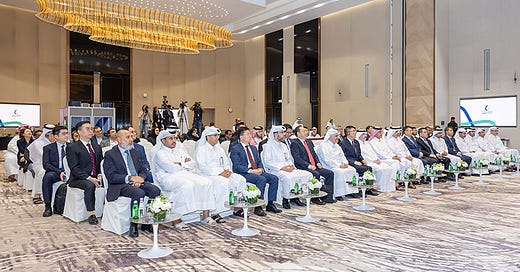From S.R.
What happens when a superpower buys up a significant portion of your energy assets? Well, whether you like it or not, you become dependent on that buyer. That is what is happening to Qatar.
He said. She said.
"It lays a solid foundation for the energy cooperation between the two sides in the next three decades."
CNPC chairman Dai Houliang touts China's latest gas deal with Qatar.
Focus
The signing ceremony of the latest China-Qatar energy deal.
The Umbilical Cord
Step by step, China is taking over Qatar's huge natural gas sector.
Every few months, the two countries come to an agreement in which Beijing commits to either develop or buy Qatar's liquefied natural gas. These are long-term deals which seriously limit Qatar's marketing and energy strategy. In a way, this marks a throwback to the 1970s when the United States essentially controlled Saudi Arabia's crude oil sector.
In the latest deal, Qatar plans to supply four million tons of LNG to China National Petroleum Corp., known as Sinopec, every year over a period of 27 years. The emirate-owned QatarEnergy will draw the fuel from the North Field East Expansion Project.
"It lays a solid foundation for the energy cooperation between the two sides in the next three decades," Sinopec chairman Dai Houliang said.
The agreement marks the longest supply deal in the LNG industry. It matches that between QatarEnergy and Sinopec in November 2022.
"The LNG supply deal, which guarantees Chinese LNG imports until the 2050s, has moved Qatar closer to China," Justin Dargin, an analyst at the Carnegie Endowment for International Peace, wrote in December 2022. "China has been proactively and meticulously building up its presence in the Gulf, as opposed to the somewhat haphazard and reactive way the West has been engaging with much of the world over the past decade."
But China wanted assurances that Qatar would be unable to back out of its long-term commitment. So, the two companies signed another agreement, this one calling for QatarEnergy to transfer five percent of the North Field East LNG expansion project to Sinopec. That figure amounts to one NFE train with a capacity of eight million tons per year.
"This transfer will see CNPC become a partner in the NFE project and will not affect the participating interests of any of the other shareholders in the project," QatarEnergy said on June 20.
This marks the second transfer of a stake in North Field to Sinopec. In April 2023, Sinopec, which also bought five percent, became the first Asian company to obtain a stake in the North Field expansion. Qatar plans to increase LNG production by 60 percent, or 126 million tons a year, by 2027.
"Qatar's energy sectors are poised for remarkable growth as the country harnesses its natural gas reserves and invests in sustainable solutions," Faiz Halim, an analyst at the London-based Energy Industries Council, said. "This creates ample opportunities as well as a sense of certainty for supply chain companies looking to add value to Qatar’s energy sector.”
Why is Qatar signing off its incredibly lucrative LNG industry to Beijing -- and what's the hurry? Obviously, there are commercial reasons, but Doha’s main consideration is strategic. The emirate regards China as a bulwark against Iranian expansion in the Gulf. And North Field, with the largest known gas reserves, extends into Iranian territory. The thinking is that Teheran will be much more careful in threatening Sinopec.
Qatar is not alone. Saudi Arabia has also given China preference to the kingdom's energy sector and for the same reason -- Iran. Iran also claims the energy-rich territorial waters which the Saudis want to develop, and Riyad feels it needs outside help.
Neither Gulf Cooperation Council state has confidence in Western security guarantees. So far, 80 percent of Qatar's LNG exports target Asia, particularly China.
The next step between QatarEnergy and Sinopec could be renewable energy. Doha wants to produce five gigawatts of solar power by 2035 and has awarded engineering, procurement, and construction contracts for two projects in Ras Laffan and Mesaieed.
"From this brand-new starting point, CNPC will continue to actively discuss with QatarEnergy all-round cooperation across the hydrocarbon industry chain and other areas like green and low carbon energies, so as to build a stable, long-term, and multi-dimensional strategic partnership," Sinopec's Dai said.
Ticker Tape
...Young Arabs say they like China. A poll by a United Arab Emirates company reported that 80 percent of respondents viewed China as an ally. The 3,600 Arabs polled ranged in ages from 18 to 24 and came from 18 countries. In contrast, those polled ranked the United States as No. 7 among allies.
...China has been promoting renewable energy in Egypt. Beijing donated such equipment as solar LED street lights and bulbs, solar home systems and energy-efficient air conditioners. At a ceremony on June 18, China's ambassador to Egypt, Liao Liqiang, said his government seeks to reduce carbon emissions in that Arab country. In 2016, the two countries signed an agreement for a joint effort against climate change.
...Beijing has attracted support from pro-Western Morocco. Moroccan Economic Inclusion Minister Younes Sekkouri defended China's economic cooperation programs with Arab and African states. Sekkouri told China's official Xinhua news agency that Beijing represents a "fair economic engine." that focuses and sustainability and stability. The minister did not disclose any new projects between China and Morocco.
...The United Arab Emirates has reported a solid increase in Chinese tourism. The emirate of Dubai said 6.02 million Chinese tourists arrived between January and April 2023, an 18.04 percent increase from the same period last year. Officials say the UAE has become one of the most popular destinations for Chinese.
...China wants the international community to increase funding to help Syria recover from its humanitarian crisis. Beijing told the United Nations Security Council that insufficient funding was blocking relief projects in Syria. China's deputy envoy to the UN, Geng Shuang, also called for the lifting of sanctions on Damascus.



